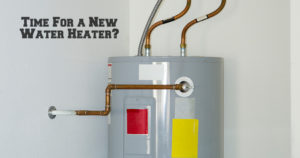When To Let Go Of That Old Water Heater
A quick guide to calling it quits with your antiquated tank water heater.
It’s big. It’s old. Sometimes it grants you hot showers. When is it time to break things off with your tank water heater and take the tankless plunge? Probably sooner, rather than later. Your home’s water heater is probably the most costly component of your plumbing system, and many common water heater problems are actually pretty easy to figure out and repair without the assistance of a plumber. These are some of the signs that your water heater does not need to be repaired, it actually needs to be replaced.

Age: Most residential water heaters are sold with a 5-year or 10-year warranty, so a new heater should last at least that long. However, if you live in an older home with an aging hot water heater, even common problems could be an indication that it is time to replace it. A hot water heater that is more than 15 or 20 years old and is clanging or knocking, failing to produce hot water, unable to produce hot water consistently, or unable to maintain a constant water temperature has probably reached the end of its life.
How do I determine the age of my water heater?
All water heaters, no matter the brand, must be equipped with a rating plate that lists important data such as the model and serial numbers, manufacturing company’s name, length of warranty, and more. Some manufacturers make it easy to determine the age of your heater by including the month and year built into the first 4 digits of the serial number. Other manufacturers require you to check their date-decoding system online. For example, the Bradford White rating plate incorporates a letter system that represents manufacturing years. The serial number might begin: “YF165…” Using their year/month decoder you can find Y = 2002 and F = June. No matter the brand, the year and month of manufacturing is available to all consumers.
Noise: Noise is always an indicator. If you hear your water heater – loud cracks and pops for instance – it may be an indication that the interaction between the heating elements and the inside heater has mineral build up on them.
Too Many Repairs: It’s only natural that your water heater system is going to require repairs every now and then, even if it’s a fairly young system. However if it is aging, and repair needs are becoming increasingly frequent, then it may make more financial sense to replace the whole thing.
Excess Water: Water seeping or lingering around the water heater means that there’s a leak somewhere. This is usually in the pipes, but it could be on any section of the water heater. While this can sometimes just be an easy fix, it could also be a sign that you need a new water heater altogether.
Rust: Regularly check to make sure your water heater isn’t experiencing any level of corrosion or rust. It’s common for a water heater to collect rust eventually, but rust in certain areas is what you need to watch out for. A good sign that it’s time for a new water heater is when there’s corrosion or rust near the pressure relief and temperature valves. Anywhere near the connections is also an indicator that the water heater needs a replacement.
Call (281) 351-6661 or contact us online for a water heater inspection or to discuss your options for an affordable and dependable water heater professionally installed anywhere in the Houston area (1960, Spring, The Woodlands, Cypress, Tomball, Magnolia) by a licensed Daniels Plumbing professional.
